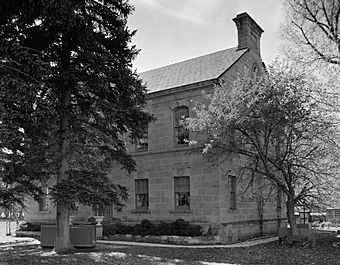Samuel P. Hoyt House facts for kids
Quick facts for kids |
|
|
Samuel P. Hoyt House
|
|

The Hoyt House in 1968
|
|
| Location | Off I-80, Hoytsville, Utah |
|---|---|
| Area | 5 acres (2.0 ha) |
| Built | 1863 |
| Architectural style | Georgian |
| NRHP reference No. | 82004163 |
| Added to NRHP | April 19, 1982 |
The Samuel P. Hoyt House is a special old building in Hoytsville, Utah. People started building it in 1863, but it was never fully finished. Work stopped in 1870. This house is important because it belonged to an early settler named Samuel P. Hoyt. It was also very big and fancy for its time and place.
Discovering the Hoyt House History
Who Was Samuel P. Hoyt?
Samuel Pierce Hoyt was born in Chester, New Hampshire in 1807. He married Emily Smith in 1834. Samuel became a member of the Church of the Latter Day Saints in 1834. This was after he met Joseph Smith, a leader of the church.
Moving West to Utah
After living in Massachusetts for a while, the Hoyts moved to Utah in 1851. They joined The Church of Jesus Christ of Latter-day Saints there. In Utah, Samuel Hoyt helped build the first capitol building. This building was planned for Fillmore.
Building a New Life
In 1856, Samuel married his second wife, Emma Bumbridge. He moved to Summit County in 1861. There, he built a gristmill in 1862. A gristmill is a place where grain is ground into flour. In 1863, he started building the famous Hoyt House.
Samuel Hoyt's Later Years
In the late 1860s, Samuel Hoyt started a ranch near Kamas. His second wife lived there. Samuel spent his last years at this ranch. His first wife, Emily, stayed in the house in Hoytsville. Samuel Hoyt passed away on August 12, 1889.
New Owners and Restoration
In 1957, George Carroll Crittenden and his wife, Luella Nicholas Crittenden, bought the house. The Crittendens started working to fix up the house. They also lived there.
Exploring the Hoyt House Design
What Does the House Look Like?
The Hoyt House is a 2-1/2 story building. This means it has two full floors and a half-story, usually in the attic. It is built in the Georgian style. This style was popular in the 1700s and early 1800s. The house is made from cut and shaped ashlar sandstone.
Special Architectural Features
According to the National Register of Historic Places, the Hoyt House is the best example of Georgian-style architecture in Utah. It has a special layout called a "center-passage double-pile plan." This means it has a hallway down the middle. There are two rooms deep on each side. The front of the house has five sections, or "bays."
Rooms and Details Inside
The main hallway leads to a formal dining room. On either side of the hall are sitting rooms and service rooms. The house has 14 rooms in total. Nine of these rooms have fireplaces. The main living area has beautiful paintings on the walls. A local artist named Olson created these murals.
Unique Basement Features
The house also has a full basement. Inside the basement, there is a well. This well is near the basement kitchen. The kitchen was connected to the upstairs by a dumbwaiter. A dumbwaiter is a small elevator used to move food or other items between floors.
National Recognition
The Samuel P. Hoyt House was officially added to the National Register of Historic Places on April 19, 1982. This means it is recognized as an important historical building.
 | Delilah Pierce |
 | Gordon Parks |
 | Augusta Savage |
 | Charles Ethan Porter |



